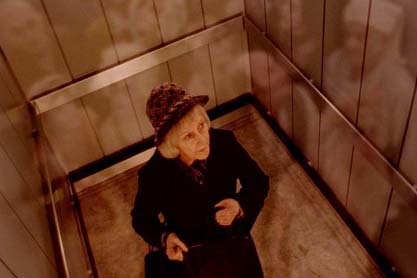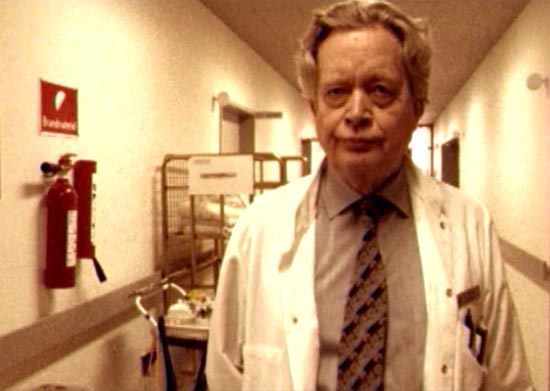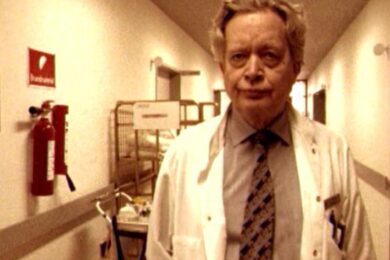In 2004, there seemed to be a sale on hospital-based horror shows. First there was Garth Marenghi’s Darkplace, a well crafted send-up of pompous Stephen King-type 80s horror dramas, set in a haunted hospital. Then a few months later, as if carelessly stepping into this comedy bear trap, Stephen King himself premiered a television series, called Kingdom Hospital based on exactly the same idea. But both shows were actually based, one respectfully and one officially, on Lars von Trier’s 1994 Danish TV show Riget (The Kingdom), a show which is obviously scarier and (arguably) funnier than either of them.
On paper, Riget really shouldn’t work. A mini-series about a hospital besieged by demons seems like a premise better suited to airport hardbacks than something dreamed up by one of Europe’s most challenging filmmakers. The theme song is an embarassing mix of ER dramatics with EBM instrumentation, orchestra hits and all. The mid-90s special effects are mostly laughable green screening with digital edges showing – tasteful but unconvincing. And the first episode seems more like a fly-on-the-wall documentary about hospital bureaucracy than a thriller.
But as the rusty red curtain draws on the first episode, von Trier himself appears wearing an uncomfortable tux and a cheeky smile, like a kid who’s just done something very, very bad. He politely apologizes to the audience for not showing much in the way of ghosts and promises next week it’ll get better, closing by asking the audience to take the good [mimes a cross] with the evil [devil horns].
As usual, von Trier is provoking his audience, as if to say ‘this might be too subtle for you’. But, considering the psychological and physical horrors von Trier subjected viewers to in his later films, it’s not the ghosts or the gore which are the provocation – it’s the fact that he’s made us watch, and enjoy, a hospital soap opera! Riget is above all a master class in writing for an ensemble cast – plus ghosts. The paranormal plot line is almost incidental, just an entertaining way of structuring all the other sub-plots.
In this way, Riget owes an incalculable debt to Twin Peaks. David Lynch’s highly influential series is a similar mix of genuinely disturbing imagery and over-the-top melodrama. Most viewers come for the weirdness, but end up staying for the small-town dynamics, and the implausible EastEnders type revelations. Von Trier affectionately describes Twin Peaks as something that Lynch did with his "left hand" – meaning that if you’re right handed, drawing with your left hand challenges you to relearn what you know, and ultimately to embrace your scribbles. In both series, there is a certain disregard for the rigid language of network television: inappropriate music, unexpected shifts in tone, purposely awkward dialogue – all of which contributes to a general feeling of unease. It’s unclear however if this is because Lynch subjected himself to the same sort of artistic constraints as von Trier.

The first series of Riget came at an interesting point in von Trier’s career, just after finishing the visually and technically ambitious Europa trilogy and just before signing the Dogme 95 manifesto which was all about putting massive constraints on the visual and technical methods of filmmaking. His first television show was certainly a huge step in the later direction, filming entirely on location using hand-held, grainy video put through a sepia filter to make it less cheap looking. The minimal style puts the focus solely on the characters, plot and the dialogue.
As one actress observed during the filming of Breaking the Waves (1995), von Trier’s first (nearly) Dogme film, Lars had spent all of his career mastering cinematic techniques but felt less comfortable dealing with characters and their emotions. Dogme was a way of challenging himself to exercise this weak muscle. As with many of these films, he succeeded largely by picking some very talented and charismatic actors, like Emily Watson and Björk, and crafting some unforgettable characters. Riget is led by by von Trier regular Ernst-Hugo Järegård, who manages to endow the comically horrible toad of a surgeon Stig Helmer with a strange kind of charm. The supporting cast includes a doctor running a black market barter-system in the basement; a blue-sky-thinking bureaucrat; a medical student who watches horror films to get over her fear of blood; and the lead neurosurgeon’s son, who subjects himself to sleep experiments in order to bed his favourite nurse.
The horror plot centres around a would-be psychic and her plucky son Bulder trying to figure out why a dead girl is haunting the elevators. They find more than they bargain for when spirits and later demons start coming out of the woodwork.. Much in the same way that Stanley Kubrick took the ghost story of King’s The Shining and turned it into a more nuanced family psycho drama, von Trier takes a patently ridiculous premise and attempts to explore how more or less ‘real’ people would react to the stress. This is not to say that it’s ‘realistic’, just that it’s fleshed out enough so that lines like "I love you but I have reason to suspect that you’re a ghost" are funny-endearing, not funny-embarrassing.

This is all part of von Trier’s peculiar and dry, some might say bad, sense of humour (did you hear the one about him being a Nazi?). You can have your heartstrings pulled by a mother-baby dynamic while simultaneously laughing at the fact that the baby is played, straight faced, by veteran German actor Udo Kier with a little demon baby body. It’s the same as falling in love with Emily Watson’s Bess McNeill in Breaking the Waves while smirking at some of the ridiculous things, von Trier has her doing – handjob on a bus?
But the humour is periodically punctuated with very skilful scares, often delivered though suggestion, not special effects. One frightful reveal is actually lurking in the background of a scene for several episodes, until both you and the characters notice it. And then there’s a hefty dose of real life medical horror – brain-injured children, unnecessary surgery, disease and death.
Drawn from von Trier’s own observations of the real Riget Hospital, the show is also wickedly effective as a satire of the medical profession. The idea of hyper-rational scientists carrying on the daily running of a hospital while being constantly confronted by paranormal happenings perfectly symbolises the way some doctors can ignore that which doesn’t fit their rigid models. The show also speaks to all that is irrational and unscientific about a hospital: it seems to be dominated by bureaucracy, targets and procedure but is actually driven by politics, illicit favours, old traditions, and various types of alternative medicine. This might seem like a very didactic way to make a point (see The Idiots and Manderlay) but it’s also comedy gold and never comes across as heavy-handed.
Unfortunately, Stephen King’s von Trier-sanctioned remake of Riget is exactly what you expect: a heavily Americanised, drawn out series with gratuitous special effects and a more spelled-out back-story – sort of the show von Trier apologised for not making in the first episode. But Garth Marenghi owes a lot more than the premise to Riget – everything from the establishing shots of the hospital, a lone doctor on the roof, demonic ceremonies and possibly even the common continuity error of wildly fluctuating levels of coffee are referenced.
What makes Riget such good remake material and spoof material, despite being deeply funny itself, is that it was so iconic to begin with. It’s overflowing with ideas which could easily be spread out to fill several seasons. Some might find it merely a less ambitious version of Twin Peaks, set in a hospital, but even in the era of The Wire and Sopranos that’s nothing to sniff at.



